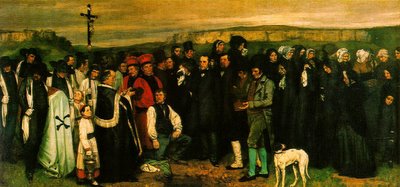Spell check doesn’t like the word uncomposed, so I’ll just go ahead and take credit for the discovery of a new word. It seems so much more fitting than discomposed, which spell check prefers. Discomposed seems to imply that the thing used to be composed, and is now in a temporary, alternate state. Uncomposed (to me anyway) feels more like intentional, permanent not-composition. That’s what we’re talking about today.
This is by Gustav Courbet, a mid-1800s French realist. This piece is monumental at over three meters high and six meters wide. It is called A Burial at Ornans.

Here’s an interesting summary of the work and its relationship to Courbet’s career.
Anyway, here you have none of the intentional lead-the-eye-through-the painting devices that were customary in French painting at the time A Burial at Ornans was painted. The people are just there rather like they would be in real life. Furthermore, like shap shots that you’ve got in your own collection, people are cut off, the dog’s feet are missing, and most of the people in the image aren’t paying attention or are looking away.
If I were a painter, it would take a lot of effort to choose not to correct life’s little imperfections. That’s actually one of the things that is kind of magical about art. You can create something that strongly reminds the viewer of their visual world even if it is totally contrived and divorced from it.
Uncomposition isn’t restricted to representational painting either. There are examples of it all over, but here’s a famous one:

That’s Jackson Pollock in an action shot of his action paintings. There is no center, no sense of dominance, foreground, background, focal point, light shadow, etc. Not there. Like Courbet's, this image isn’t about clever artistic composition.

3 comments:
is uncomposed really a word you made up, or is it a standard art theory term? would an analogous term be 'formless'? i think i object to that notion (but probably just don't understand it). john cage said that every [musical] element may be destroyed, but form would of necessity survive. perhaps it's time the art world took a cue from the music world. we prefer the term 'free-composed' or 'through-composed', but nevertheless, composed.
This reminds me of the work of an exciting new artist, who is still relatively unknown.
Josh, uncomposed might be an art term, but spell check wouldn't take it. I don't think formless works, because Courbet's painting certainly has form. Art has done lots in reaction to music. I'll write about that soon. Thanks for another idea.
Hey joe, I have that artist in my personal collection. Framed and everything.
Post a Comment